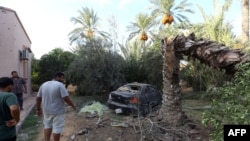U.N. and international aid agencies are working to move refugees and migrants out of harm's way in Libya as local militia and tribal leaders, vying for control of the capital, clash for a fifth day.
Libyan authorities report 30 people, many of them civilians, have been killed and 96 wounded during the fighting. The charity Doctors Without Borders warns that the lives of local residents, as well as 8,000 refugees, asylum-seekers and migrants, are at risk.
More than 5,800 people reportedly have been displaced, according to a spokesman for the International Organization for Migration, Paul Dillon. Earlier this week, the IOM, with help from Libyan and Malian authorities, returned 164 migrants to their homes of origin in Mali, he said, adding that there is a waiting list of migrants from Somalia and other African countries who want to go home.
"We are also looking to try and speed up the voluntary humanitarian return part of this. Many of the people of the Somalia caseload were already sort of in the pipeline and we are looking to find ways to accelerate that process. Obviously, we are working closely with the UNHCR on these matters," Dillion said.
A joint effort by several U.N. and international agencies on Tuesday succeeded in evacuating some 300 refugees and migrants held in Ain Zara detention center in Tripoli. The U.N. refugee agency says the detainees were in danger of becoming caught in the hostilities.
The UNHCR says those released from detention come mainly from Eritrea, Ethiopia and Somalia, and have been moved to a safer location.
Many Libyan families also have been displaced by the fighting, with some taking shelter in the detention centers emptied of their refugee and migrant inmates, Dillon said.





